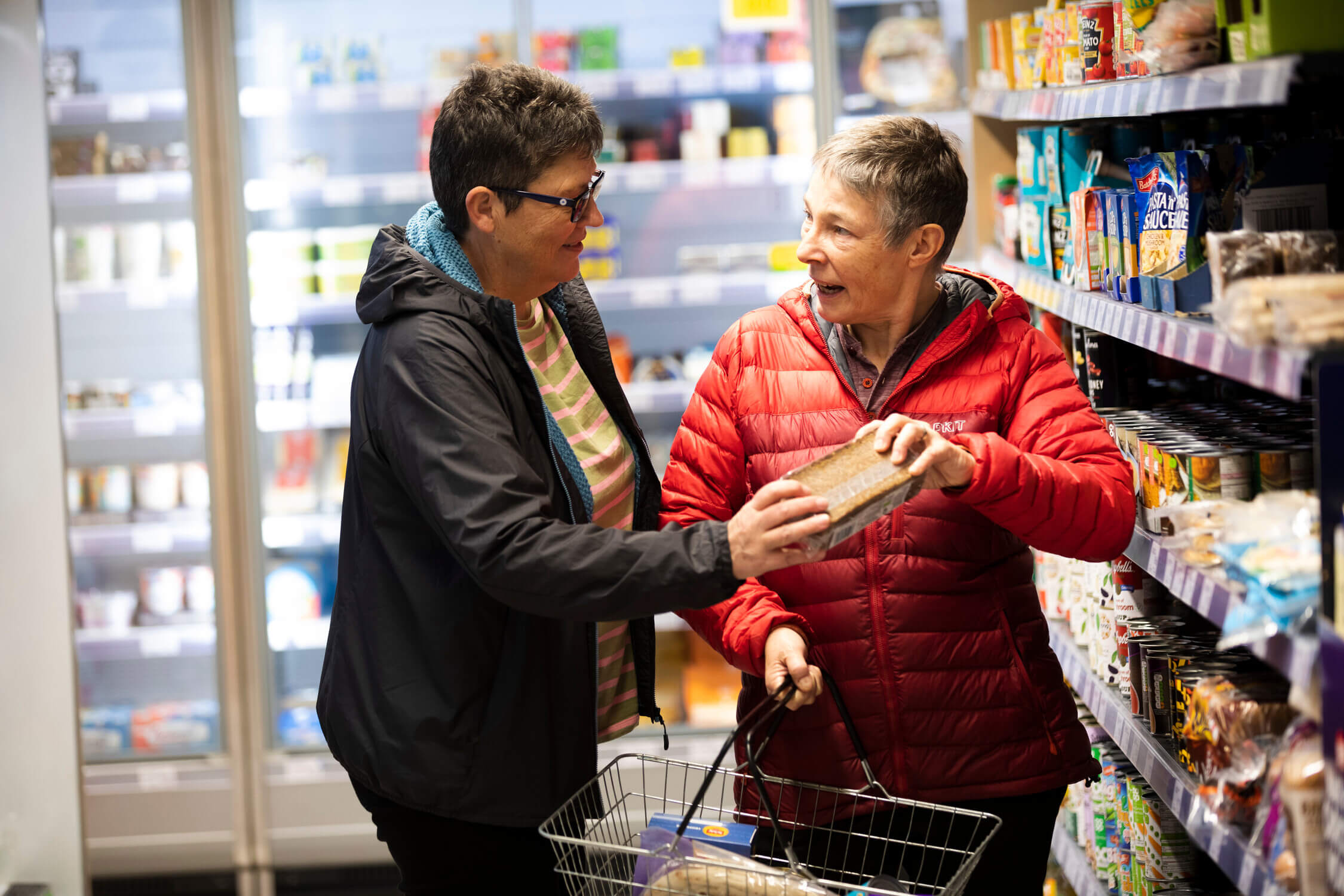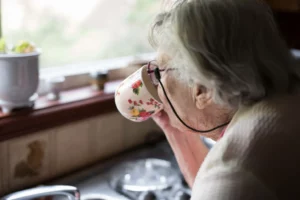Nutritional needs for the elderly living with dementia
Tags
Dementia Care
Maintaining a healthy weight and ensuring our bodies get the nutrients it needs can get more difficult with age, and dementia symptoms may make this more challenging, as it often has an impact on appetite and the ability to eat and drink. We’ve looked at some of the changes below, and shared guidance from leading dementia organisations on things you may wish to try at meal times.
Ideally people in later life should follow a diet rich in 4 main food groups. These are outlined in the NHS’ ‘EatWell’ plate –
Fruits and vegetables – aiming for 5 portions a day. Dark leafy vegetables may be especially good for elderly people, as they contain carotenoids which are beneficial to eyes, as well as Vitamin K, which has been linked to preventing osteoporosis.
Starchy carbohydrates – should make up just over a third of the food we eat. This group includes potatoes, brown rice and bread,
Protein – This includes beans, lentils, lean meat and fish. It’s advised to aim for at least 2 portions of fish every week, 1 of which should be an oily fish variety, such as salmon or sardines.
Dairy – dairy and eggs are also good sources of protein and can help support bone health, which is important for older people who are more at risk of falls. The NHS advise choosing lower-fat and lower-sugar products where possible.
The guidance also suggests choosing unsaturated fats like olive oil, over saturated fats like butter – and eating these in moderation.
See the full NHS guidance here.
However, adults with dementia can face a range of challenges when it comes to maintaining a healthy diet and proper nutrition.
In the early stage of dementia, when cognitive function starts to be impacted, a person may struggle to shop for themselves – which is the first step to eating a balanced diet. According to the Alzheimer’s Society, 80% of people with dementia said shopping was one of their favourite things to do, but 63% found it increasingly difficult and didn’t think shops were doing enough to help them shop independently.
The bright lights, noise, and overwhelming choices in supermarkets can prove too much. Cognitive impairment can also make it difficult to navigate a shop, especially if they’ve moved products around, and paying for things at the till may leave a person confused or flustered if they struggle to work out the right money to pay. This may lead to inconsistent dietary choices, limit the availability of food, or lead to an over reliance on convenience foods or ready meals.
How to make food shopping more comfortable for a person with dementia –
- Sit down with them and plan what meals they’d like to eat that week. Make a shopping list before heading to the supermarket. Try to list items in food groups or in order of the supermarket isles.
- Keep communicating and stay close when shopping with someone with dementia. Take it one isle at a time.
- Check whether the store has dementia-friendly hours – these are usually quieter times of day, with some stores turning down bright lights and music.
- Contact the shop to ask if they’ve encouraged staff to complete a Dementia Friends session, this gives staff a better understanding of the needs of someone with dementia.

How else can dementia affect the nutritional status of elderly?
According to Dementia UK, there are a number of challenging symptoms that can impact a person’s dietary intake, and some may emerge or get worse over time. These include –
- forgetting to eat, or not recognising when they’re hungry. This may increase a person’s risk of malnutrition
- forgetting to drink or not being aware that their thirsty
- struggling to prepare food or drinks
- struggling to recognise a variety of foods
- experiencing a change in their appetite or tastes
- finding certain textures or smells of food off-putting
- finding it more difficult to follow a specialist diet, for example if they have, coeliac disease, are vegan, or can’t eat certain foods due to religious beliefs
- finding it difficult to grip and use cutlery properly
- finding it difficult to chew or swallow
- developing a sweet tooth, and being less keen on healthy foods
Eating well with dementia
It can be worrying when a loved one’s eating habits change, especially as we’ve covered – there’s a lot of changes to look out for and how dementia impacts food intake can differ from person to person.
For example, people who develop a sweet tooth may gain body weight, while those who find certain colours or smells of putting, or have a drop in their appetite are more likely to experience weight loss.
To help you support a loved on in getting the nutrition they need and enjoy meal times, we’ve looked at tips from leading experts at Carers UK and Dementia UK.
Reach out to a GP or dentist
If you’ve noticed changes in the person’s appetite, eating or drinking habits, it’s always a good idea to raise these with your loved one’s GP or dentist first, to rule out any other medical conditions that may be causing them. They can also offer medical advice to help you manage these changes, or may recommend taking certain nutritional supplements. Remember, eating less or limiting fluid intake can lead to things like dehydration and constipation which may make other dementia symptoms worse.
Speak to a speech and language therapist
Sometimes dementia can make it difficult to swallow. A speech and language therapist (SALT) can assess what difficulties a person may be having, and offer support through swallowing and speech exercises, helping them adjust their posture when eating, and offering dietary advice and modifications, such as trying different types, sizes, and consistencies of foods.
Little and often
Someone with a lower appetite may find a big meal overwhelming. Offering small portions of food throughout the day, or finger foods such as boiled eggs, bread soldiers with a favourite spread, or dried fruit may help increase food intake. Finger foods are particularly good as they’re generally served cold so there’s no rush for a person to eat them.
The NHS has some high-calorie finger food suggestions in this guide.
Fortifying foods for extra calories
If weight loss is a concern, some people find it beneficial to add skimmed milk powder to food and milky drinks. You can find skimmed milk powder in most supermarkets.
Finding new ways to satisfy a sweet tooth
Unfortunately most sweet foods aren’t known for their nutritional intake. Some people find that adding sweet condiments like ketchup to foods can help satisfy cravings, while switching out a daily dose of sugar with healthier food such as a piece of fruit or low-calorie yogurt can be beneficial.
Mealtime considerations
In the mid to later stages, too many distractions and options can make it difficult to concentrate on the task of eating. Offering one type of food at a time may help. Avoiding patterned plates and tablecloths is important too – however, ensuring the plate is a different colour from the table and easy to distinguish can help with focus. This is because dementia can change a person’s spatial abilities.
It’s also a good idea to check the temperature of any food – as people with dementia may struggle to tell if something is too hot to consume.
Call us for a no-obligation chat about your care needs
The Challenges of Vegetarians and Vegans Living with Dementia
The choice to be a vegetarian or vegan often comes with deeply held beliefs and is a key part of someone’s identity. So what happens in later life when people are not able to shop and cook for themselves
Learn more about dementia care
Take a look at more Elder guides on living with and caring for dementia.

Dementia care – how do I pay for it?
Dementia Live-in Care: How Do I Pay for It? If your loved one is living with dementia, it can be difficult to work out

Types of dementia
Common types of dementia Every dementia journey is different, and not everyone will experience the same symptoms. However, understanding the different types of dementia

What are the signs of dementia in women?
Did you know women have a greater risk of developing dementia over their lifetime than men? 600,000+ women in the UK are currently living

Dementia and sundowning – advice for caregivers
Dementia care – what is sundowning? Sundowning – sometimes referred to as ‘late-day confusion’ – is a symptom that causes those living with dementia

Discrimination and dementia
Overcoming discrimination and stigma can be a huge challenge for those living with dementia. We’ve looked at some of the common situations where people

Recognising the signs of frailty in someone with dementia
By understanding and recognising frailty, you can help a person with dementia to access the right care, reduce the risk of ending up in